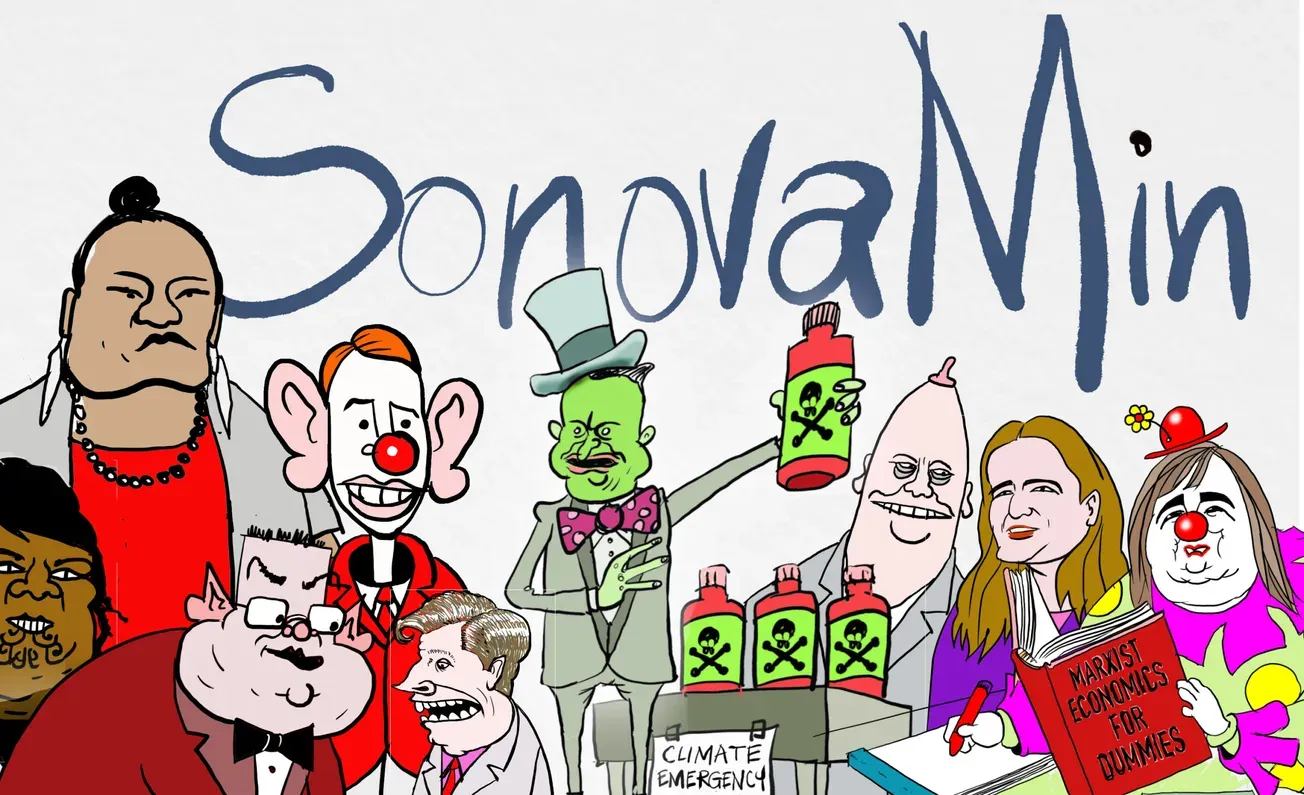Table of Contents
If you don’t have a Silver level membership yet you are missing out on our Insight Politics articles.
If You Know, You Just Know
If you have to ask, you’ll never know
If you have to ask what jazz is, you’ll never know.” So said Louis Armstrong, when asked to define Jazz. The same might be said in reply to the (post?) modern fad for brow-furrowing over what is an Australian (or New Zealand) identity.
In last week’s Insight, Nathan Smith had a tilt at the question, writing that, These are fairly basic questions that no one ever wants to answer. Quite the contrary, it’s a question that has generated rivers of ink, miles of film, and enough hot air to melt the ice caps. The real problem is that the answers seem to dissolve into nothingness when under scrutiny.
In this article I’ll discuss mostly Australian matters, mostly because I know them best, but our sibling relationship being what it is, everything I write about Australia is no doubt applicable to New Zealand.
In many ways, the question of identity is a very modern one, which, like so many other bad ideas which continue to plague the world, was first farted out by the “intellectual” classes of the 1960s. Initially, it was an assertive debate: for Australian intellectuals and artists of the 1960s, taking advantage of the first era of relatively cheap overseas travel, a pilgrimage to Britain — then still often thought of as “the Mother Country” — became almost mandatory. Yet, derided by the Brits as “Colonials”, Australians more aggressively asserted their Australian-ness.
This, it should be noted, was a revival of a very early trend in Australian culture. Within a few decades of British settlement in Australia, the Australian-born children of British settlers began to regard themselves as quite distinct. By the early 19th century, “Currency Lads” and “Lasses” distinguished themselves from the “Sterling” “New Chums”. And, like Jazz, “everyone knew what it implied”.
The etymology of the term echoed the cultural assertiveness of the 1960s. While sterling was the only legal tender of the colonies, shortages meant that ready-made alternatives, dubbed “currency”, freely circulated. Thus, “currency”, applied to the native-born, initially carried connotations of inferiority. But, just as American blacks reclaimed “nigger”, the Currency Lads and Lasses appropriated a derogatory term as a badge of pride. By 1832, native-born Horatio Wills founded The Currency Lad newspaper, “to protect the interests of the native-born”.
Nevertheless, the idea that Australian-born and made was somehow inferior to “sterling” stuff from Britain, and post-War, America, persisted. This became known as the “Cultural Cringe”, and to their credit, a generation of intellectuals and artists such as Philip Adams, Barry Humphries, Clive James, and so on, did much to demolish it. By the 1970s, the idea that Australian-made could be just as good as, if not far superior to foreign stuff was cemented. Its climactic moments came in the 1980s, when the Americas Cup win, the music of INXS, and the films of George Miller and Peter Weir, showed that Australians could beat even the Yanks at their own games.
(It’s sobering to recall just how astonishing it was, in the early 70s, to even see an Australian film at the local pictures, rather than some unknown “arty” cinema in the capital cities. I can only imagine that the same must have been true for Kiwis.)
A backlash was inevitable, and it had been brewing since the 1970s (and often chattered by much the same people who’d set out to assert Australian cultural validity in the first place). Australians might be the equal of anyone, they fretted, but what are Australians? As the pernicious doctrines of Multiculturalism and Post-Modernism took the place of thought in the increasingly empty heads of the “intelligentsia”, the idea grew that Australians weren’t really anything at all. We were, in the words of the poet Les Murray, “made fully nothing by our own, at home and abroad”.
The Multicultural sneer at the very idea of Australian-ness also became coupled with the new-found fetishisation of Aboriginal culture and the land rights movement. We were, supposedly, still just “Currency” people in its most negative sense: inferior British interlopers who just happened to be born in Australia. “Not indigenous, merely born here,” as Murray wrote.
This suited the Multicult perfectly. If there was no uniquely Australian identity, then there was nothing for new arrivals to assimilate to. “The least adaptable,” to quote Murray again, “the most multicultural”. But it also leads to bizarrely self-contradictory arguments. For instance, the Multicult will argue that because there is no clear Australian identity, Abdul just off the boat is (to borrow the slogan of a popular inner-city poster campaign) “100% Aussie”.
Yet, that very argument necessarily supposes that there is something “Aussie” (or Kiwi) that one can be, 100%.
So, what is it?
It’s here that everything dissolves into elusive phantoms again. Is it about loving sport? Beer? Being a resourceful, bushman type? All of these are no doubt qualities many would associate with Australians, but not every Australian is a devoted sportsman (or spectator), or beer-drinker. The Australian bushman was very much a minority even by the late 19th century, when Australia was one of the most urbanised societies in the world, and Banjo Paterson’s narrator of Clancy of the Overflow, nested in a “dingy little office” in the “dusty, dirty city”, can only daydream of the “vision splendid of the sunlit plains extended”.
Or perhaps the character of the Australian is better captured by the magnificent stained glass windows of the Hall of Memory at the Australian War Memorial. It was, after all, in the crucible of the Great War that Australians’ (and Kiwis’) sense of their uniqueness was forged. That both nations went to war under the shared banner of ANZAC emphasises again the closeness of Australian and New Zealand identities.
The qualities of the Australian and New Zealand soldier, as identified by the Hall of Memory, are resource, candour, devotion, curiosity, independence, comradeship, ancestry, patriotism, chivalry, loyalty, coolness, control, audacity, endurance, decision.
Of course, it will be correctly objected that none of those qualities are unique to Australians and Kiwis. But, neither are, say, any one of the qualities of a Chinese or an African unique to them, either. What matters is the qualities in combination. Candour, say, or independence: it was not uncommon for British enlisted soldiers to mistake their Australian counterparts for officers, for Australians’ bold sense of humour (not to say insolence) and independence were the sort of thing they had previously only experienced in the self-confident upper-classes who filled the officers’ messes. One may add Resourcefulness, known as “Number 8 Fencing Wire mentality” to Kiwis, or “She’ll be right”, to Australians.
Indeed, just as siblings, especially twins, may be difficult to distinguish for strangers, while being immediately obvious to one of the family, the subtle differences between Australians and New Zealanders are as obvious to us as they are impenetrable to foreigners. Even at Gallipoli, it was remarked that New Zealanders were less often shot, because they were sensible enough to keep their heads down under fire, while Australians seemed to regard such a thing as below their dignity. Our accents, too, the source of much mirth on both sides of the Tasman, are indistinguishable to an American, much less a Brit.
But that still leaves unanswered, to an exactitude, just what is an Australian. The Hall of Memory qualities, even in aggregate, may be said not to be unique. Contrariwise, many Australians or Kiwis may not obviously display many of these qualities.
Like “what is Art?” or “what is a woman?”, it’s a question which defies clear-cut answers.
(For those who would argue that “what is a woman?” is simple: “adult human female”, I would refer to my earlier Insight article on that very question. What at first seems obvious quickly fades into confusion: what is an adult? A human? A female? and so on.)
In the end, are we wasting our time chasing after a clear-cut definition?
Might it not be easier, in the end, to define Australian or New Zealand-ness, not positively, but negatively? If we can’t say for sure what an Australian is, we can certainly say for sure what he isn’t.
We may not be able to say whether a person with an intersex condition is definitely a woman or not, but we can say for certainty that an XY-chromosomal, bearded muscle man with a penis absolutely is not.
A Chinese immigrant of long-standing, or her children, who speaks English like a native, with an Australian accent, is laid-back, easygoing, egalitarian, and follows the Cats or the Rabbitohs with die-hard fervour, is undoubtedly an Australian. But an ethnic Han, born in China, a Chinese citizen, speaking only Mandarin, who spends maybe a week or two in New Zealand a year, and wouldn’t know a Red Band from a jar of Marmite, is, without a doubt, not a Kiwi.
In the end, though, perhaps it’s a case of, if you have to ask, you’ll never know. We know who we are. Those who don’t, well: maybe they are not us.
If you enjoyed that FREE taste why not subscribe to a SILVER level membership today?
**If you already have a Basic or Bronze Membership upgrade your subscription here.
You will not only get access to Insight Politics articles like the one above but you will also gain access to all our puzzles, SonovaMin and BoomSlang’s fantastic cartoons, and our private members’ forum MyBFD as well as enjoying ad-free viewing.
$25 a month ($6.25 a week) (89c a day)
$300 a year









